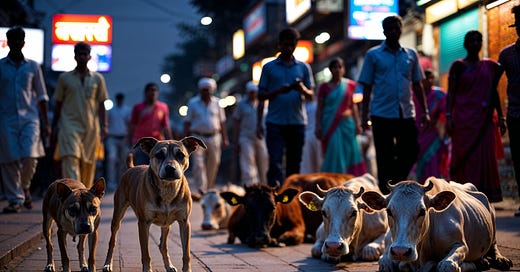Reimagining Our Relationship with Animals in Modern India
Personal Reflections on Animal Rights in India
Growing up in Bangalore, I had the joy of adopting dogs and sharing their companionship; however, I now carry deep guilt about how I treated them. Our pet dog, a black lab named Jackie (rest in peace, Jackie! I miss you to this day), was confined to a small area for long hours within our walled compound. I now realize that this was deeply inhumane, a result of my own ignorance as well as a broader societal misunderstanding of animals. This includes the way we view pets, working animals that pull carts through crowded streets, entertainment props in circuses, and the religious symbols paraded through temples.
Now, living in the Midwest, I often watch deer pause in my yard, their eyes meeting mine in moments of silent contemplation. These encounters make it impossible to deny their sentience—their capacity for fear, curiosity, and perhaps even serenity. This understanding made my past treatment of animals all the more painful to reckon with. I share these reflections not from any moral high ground – I'm still far from perfect in my relationship with animals – but from a place of growing awareness about our shared existence on this planet.
This realization deepened during my recent conversation with Varnika Singh, an experienced, compassionate, and tenacious Animal Protection Lawyer with the Federation of Indian Animal Protection Organizations (FIAPO), New Delhi, India. The discussion laid bare the stark reality of animal rights in India – a reality where the fine for animal cruelty ranges from ₹10 to ₹50 (less than the cost of a loaf of bread) and also, might I add - the discussion garnered unprecedented engagement – a combined 650+ views in just three days (a big milestone for a small-time YouTuber like myself) – suggesting that many others share this awakening consciousness about animal rights or were curious enough about Animal Rights in India to check it out.
Here’s a short clip from the conversation:
Structural Challenges
The situation becomes even more troubling when we look at law enforcement. As Varnika revealed, getting police to register animal cruelty cases is an uphill battle. "Police are super burdened," she explained, "Sometimes it comes as a shock to them that there is such an act for animals" (Referring to the Prevention of Cruelty to Animals Act).
And therefore, it shouldn’t come as a surprise that out of nearly half a million animal cruelty cases reported between 2012-2018, less than 2,000 resulted in arrests – a conviction rate of less than 0.5%.
Perhaps the most telling thing is how we refer to animals in everyday language. Many Indians, including my family members, refer to animals as "it" rather than "he" or "she" – a subtle but significant indicator of how we've objectified living beings capable of feeling pain, joy, and everything in between.
It’s worth noting that the paradox of animal treatment in India mirrors a broader societal pattern. Just as we enshrine human rights in the Indian Constitution while struggling to prevent violence against vulnerable populations, we proclaim religious reverence for animals while subjecting them to systemic abuse. Every day, we witness maimed dogs navigating chaotic traffic, cattle consuming plastic waste near temples, and elephants – supposedly sacred embodiments of Lord Ganesha – enduring psychological and physical torture in religious processions.
A Path Forward
The science is unequivocal. A 2012 study from the National Institute of Health confirmed what many of us intuitively know: animals are sentient beings capable of experiencing a wide range of emotions, from pain to joy, from fear to affection. The findings are scientifically rigorous and intuitively self-evident - life experiences pain, joy, fear, and affection in fundamentally similar ways, regardless of geography. A cow in India feels pain no differently than a cow in the Netherlands. The universal nature of sentience transcends borders, making it imperative that we recognize and respect the dignity of all living beings, wherever they may be.
Animal Law Expert Dulki Seethawaka points out that progress doesn't require extreme measures like universal veganism. We can start with smaller steps: reducing meat consumption, incorporating plant-based alternatives like coconut milk for richness in vegetarian dishes, and supporting politicians/policymakers who advocate for science-based animal welfare policies. The goal isn't to achieve perfection overnight but to consistently move toward a more compassionate society while acknowledging our limitations. While poverty is often cited as justification for using animals as beasts of burden, we could engineer cost-effective technological capabilities and resources to implement alternatives. Additionally, battery-powered vehicles for transportation could be subsidized, eliminating not only animal suffering but also the inefficiencies associated with maintaining animal infrastructure such as stables and waste management.
The Netherlands offers an instructive example of pragmatic progress. Dutch society has reduced animal suffering through systematic changes while acknowledging their imperfect implementation. Their animal welfare policies ensure five fundamental freedoms: freedom from hunger and thirst, discomfort, pain, fear, and the freedom to express normal behavior. While enforcement isn't perfect, their framework demonstrates how a society can work towards better treatment of animals without demanding immediate perfection.
From a broader systemic reform perspective - we perhaps could use a three-pronged approach to address this crisis:
1. Legal Reform: Strengthening animal protection laws and their enforcement mechanisms
2. Educational Initiative: Incorporating animal welfare into school curricula to foster empathy from an early age
3. Cultural Shift: Challenging and changing the narrative around animal sentience and rights
We could also start small – by reconsidering how we speak about and treat animals in our daily lives. We can support organizations like FIAPO fighting legal battles for animal rights. We can raise our voices when we witness cruelty and demand better from our lawmakers and law enforcers.
Because ultimately, how we treat animals says a lot about us, our values, and the kind of society we want to build.
Love Always,
The Curious Nobody
---





